Japan-India Relations
Japan-India Summit Meeting
September 14, 2017
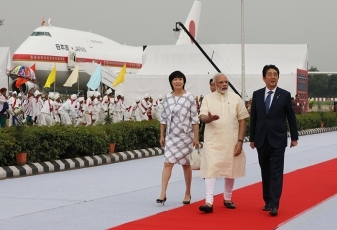 Photo: Cabinet Public Relations Office
Photo: Cabinet Public Relations Office
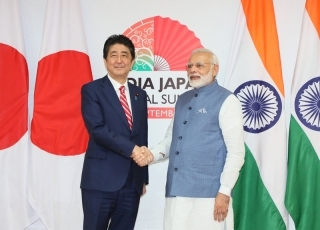 Photo: Cabinet Public Relations Office
Photo: Cabinet Public Relations Office
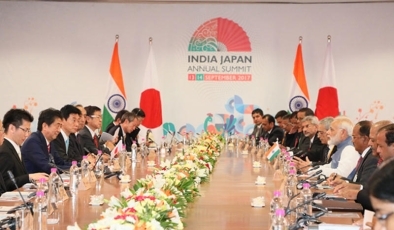 Photo: Cabinet Public Relations Office
Photo: Cabinet Public Relations Office
On Thursday, September 14, from 12:25 p.m. to 1:30 p.m., Mr. Shinzo Abe, Prime Minister of Japan, visited the State of Gujarat, the Republic of India, and held a Japan-India Summit Meeting with H.E. Mr. Narendra Modi, Prime Minister of India. The overview is as follows. After the meeting, the two leaders signed a Japan-India Joint Statement (PDF)  stating that they will cooperate to elevate the Japan-India partnership to the next level.
stating that they will cooperate to elevate the Japan-India partnership to the next level.
 stating that they will cooperate to elevate the Japan-India partnership to the next level.
stating that they will cooperate to elevate the Japan-India partnership to the next level.
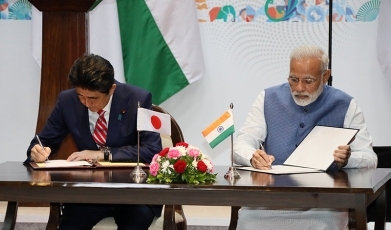 Photo: Cabinet Public Relations Office
Photo: Cabinet Public Relations Office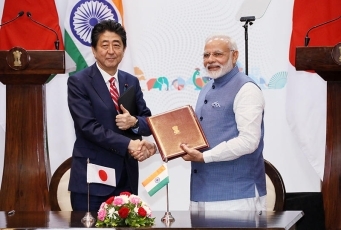 Photo: Cabinet Public Relations Office
Photo: Cabinet Public Relations Office
1 Beginning
Prime Minister Abe stated that this is the 10th Japan-India Summit Meeting in total, and expressed the view that a strong India benefits Japan, and a strong Japan benefits India, and that the Japan-India relationship is blessed with the largest potential for development of any bilateral relationship in the world. Prime Minister Abe explained that together with Prime Minister Modi, he hopes to ensure that this bilateral relationship produces results on all fronts and to lead the way to peace and prosperity of the Indo-Pacific region and the world.
In response, Prime Minister Modi expressed his great joy in welcoming Prime Minister Abe to his home state of Gujarat, and his support for seeking greater synergy between the “Act East” policy and the “Free and Open Indo-Pacific Strategy.”
In response, Prime Minister Modi expressed his great joy in welcoming Prime Minister Abe to his home state of Gujarat, and his support for seeking greater synergy between the “Act East” policy and the “Free and Open Indo-Pacific Strategy.”
2 Connectivity
Prime Minister Abe stated that Japan-India cooperation is strategically important for strengthening connectivity, and that he intends to accelerate the formation of concrete projects reaching from Southeast Asia to Africa, and to implement comprehensive support for northeast India, focused on infrastructure development and people-to-people exchanges.
Prime Minister Modi explained that the strengthening of connectivity by Japan and India is also important for the further development of the Indo-Pacific region. He stated that he intends to promote concrete cooperation with Japan, to include the ASEAN countries and Africa.
Prime Minister Modi explained that the strengthening of connectivity by Japan and India is also important for the further development of the Indo-Pacific region. He stated that he intends to promote concrete cooperation with Japan, to include the ASEAN countries and Africa.
3 Regional affairs (North Korea)
Prime Minister Abe and Prime Minister Modi fully concur that Japan and India will adopt firm responses to the North Korea problem, and they call on the international community as a whole to rigorously and fully implement relevant UNSC resolution and bring about change in North Korea’s policies.
4 Ground-breaking ceremony for India’s high-speed rail project
Prime Minister Abe expressed his gratitude for a wonderful ceremony celebrating the commencement of India’s high-speed rail project. He stated that solid results are being achieved, including the start of construction of training facilities and the provision for a yen loan of 100 billion yen. Prime Minister Abe explained that he intends to push forward the “Make in India” policy at the government and private-sector levels, and welcomed collaboration between Kawasaki Heavy Industries, Ltd. and Bharat Heavy Electricals Ltd. (BHEL). Prime Minister Abe stated that Japan intends to contribute to ensuring the safety of India’s conventional railway system by pursuing cooperation through initiatives such as dispatching experts and holding rail safety seminars.
Prime Minister Modi explained that the realization of the high-speed rail is generating strong interest from India’s citizens and from overseas, and he hopes to make the cooperation with Japan a success. Prime Minister Modi stated that it is important to give the people of India a dream and to work towards it together. Prime Minister Modi reiterated his hope to make every effort towards the early completion of the high-speed rail.
Prime Minister Modi explained that the realization of the high-speed rail is generating strong interest from India’s citizens and from overseas, and he hopes to make the cooperation with Japan a success. Prime Minister Modi stated that it is important to give the people of India a dream and to work towards it together. Prime Minister Modi reiterated his hope to make every effort towards the early completion of the high-speed rail.
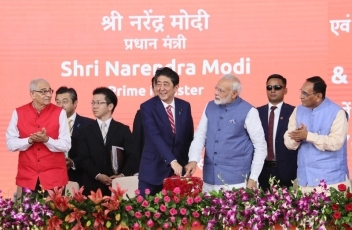 Photo: Cabinet Public Relations Office
Photo: Cabinet Public Relations Office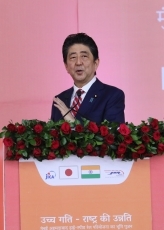 Photo: Cabinet Public Relations Office
Photo: Cabinet Public Relations Office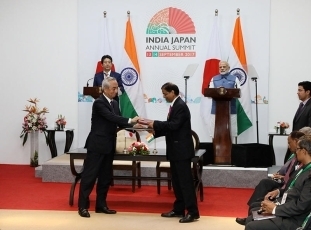 Photo: Cabinet Public Relations Office
Photo: Cabinet Public Relations Office
5 Politics and security
Prime Minister Abe expressed his expectation that the commencement of discussions on research cooperation in fields such as Unmanned Ground Vehicles (UGVs) and Robotics will serve as opportunities for advancing defense equipment and technology cooperation going forward, and that prompt and concrete progress will be made regarding the US-2. Prime Minister Abe welcomed that “Malabar” was held as the first joint Japan-India-U.S. exercise, and stated that he hoped to expand cooperation in all services, including land and air.
Prime Minister Modi welcomed cooperation on defense equipment, and the strengthening of joint exercises, beginning with the Malabar exercise. Prime Minister Modi explained that he intended to continue the bilateral discussion on the US-2, and noted that collaboration among Japan, the United States and India and like-minded countries such as Japan, India and Australia is important and he intends to pursue it.
Prime Minister Modi welcomed cooperation on defense equipment, and the strengthening of joint exercises, beginning with the Malabar exercise. Prime Minister Modi explained that he intended to continue the bilateral discussion on the US-2, and noted that collaboration among Japan, the United States and India and like-minded countries such as Japan, India and Australia is important and he intends to pursue it.
6 Economy and economic cooperation
Prime Minister Abe stated that he intends to utilize the strengths of Japan and India to strengthen the foundations of investment and human resources, push forward the “Make in India” policy and export from India to the world. Prime Minister Abe welcomed the Investment Promotion Roadmap and the agreement between the Ministry of Economy, Trade and Industry (METI) and the State of Gujarat. Prime Minister Abe introduced the opening of four Japan-India Institutes for Manufacturing (JIMs) from Suzuki Motor Corporation, Toyota Motor Corporation, Daikin Industries, Ltd., and Yamaha Motor Co., Ltd. and an endowed lecture program this summer. Prime Minister Abe stated that he is pleased that on this day it was possible to present the Varanasi Convention Center to the citizens of both countries as evidence of the friendship between Japan and India.
Prime Minister Modi welcomed that Japanese companies are investing and setting up businesses in India and contributing to Make in India, and welcomed the Investment Promotion Roadmap. Prime Minister Modi stated the pursuit of environmental measures is important and hopes to further cooperate with Japan, including in the fields of hybrid vehicles and photovoltaic power generation. Prime Minister Modi expressed gratitude for Japan’s support for ship recycling yards, and Japan’s decision to support the Varanasi Convention Center, which is evidence of the friendship between Japan and India.
Prime Minister Modi welcomed that Japanese companies are investing and setting up businesses in India and contributing to Make in India, and welcomed the Investment Promotion Roadmap. Prime Minister Modi stated the pursuit of environmental measures is important and hopes to further cooperate with Japan, including in the fields of hybrid vehicles and photovoltaic power generation. Prime Minister Modi expressed gratitude for Japan’s support for ship recycling yards, and Japan’s decision to support the Varanasi Convention Center, which is evidence of the friendship between Japan and India.
7 Human resources development
Prime Minister Abe stated that he intends to expand people-to-people exchanges in fields such as tourism from this year, the Year of Japan-India Friendly Exchanges, toward the Tokyo Olympic and Paralympic Games in 2020. Prime Minister Abe welcomed the agreement on open sky arrangements and sports exchanges, and expressed his wish to invigorate exchanges through films and his intention to implement further easing of visa requirements in the future. Prime Minister Abe also expressed that strengthening Japanese language education in India will contribute to widening the base for business and people-to-people exchanges, and explained that he intends to implement Japanese language teacher training for 1,000 teachers, on the premise that Japanese language courses will be launched at 100 educational institutions.
Prime Minister Modi welcomed the Japanese side’s various initiatives for people-to-people exchanges, and expressed the view that there is significant potential in the field of people-to-people exchanges, and that Japan’s initiatives are contributing to the promotion of friendly relations between the two countries. Prime Minister Modi welcomed the opening of the Japan National Tourism Organization (JNTO)’s Delhi office, and expressed his understanding of the importance of strengthening Japanese language education in India, and his hopes for collaboration with Japan for its promotion.
Prime Minister Modi welcomed the Japanese side’s various initiatives for people-to-people exchanges, and expressed the view that there is significant potential in the field of people-to-people exchanges, and that Japan’s initiatives are contributing to the promotion of friendly relations between the two countries. Prime Minister Modi welcomed the opening of the Japan National Tourism Organization (JNTO)’s Delhi office, and expressed his understanding of the importance of strengthening Japanese language education in India, and his hopes for collaboration with Japan for its promotion.
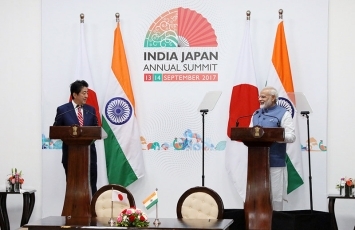 Photo: Cabinet Public Relations Office
Photo: Cabinet Public Relations Office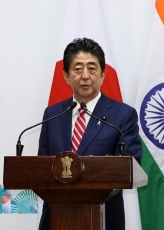 Photo: Cabinet Public Relations Office
Photo: Cabinet Public Relations Office

